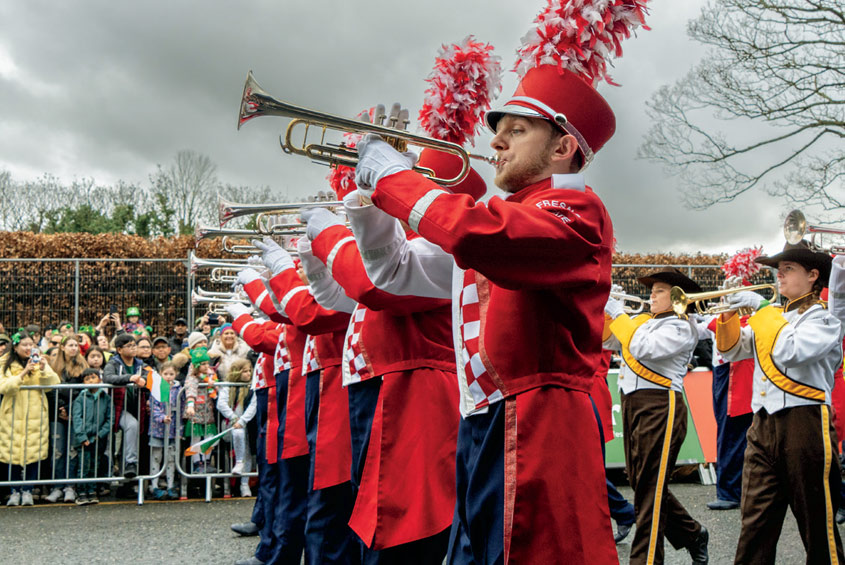Fresno State News Briefs
Bulldog Marching Band Goes Global
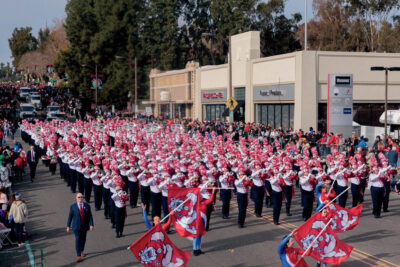 About two months after the Fresno State Bulldog Marching Band performed in the Rose Parade in Pasadena for the first time, about 100 members of the band were selected to perform at the annual St. Patrick’s Day Parade in Dublin, Ireland as part of the Mountain West Conference All Star Band.
About two months after the Fresno State Bulldog Marching Band performed in the Rose Parade in Pasadena for the first time, about 100 members of the band were selected to perform at the annual St. Patrick’s Day Parade in Dublin, Ireland as part of the Mountain West Conference All Star Band.
“The Tournament of Roses Parade is the pinnacle of honor for a college marching band, and I am immensely proud of what our student musicians have achieved,” said Steve McKeithen, director of the Bulldog Marching Band, prior to the performance.
The 270-member Fresno State Bulldog Marching Band is the largest student organization on campus, with members representing all eight of the various schools and colleges and consisting of a diverse group of students from all over California, the United States and the world.
In the past decade, the band has performed at six bowl games and two NFL games.
“This is truly a transformative experience for all of them, and we’re very proud of the band’s accomplishments and recognition far and wide,” says Dr. Honora Chapman, dean of the College of Arts and Humanities at Fresno State, of the performance in Ireland.
— Benjamin Kirk (’22)
Faculty Matters

Water Storage: Searching for Solutions
Record-breaking atmospheric rivers hit the state in January, and while that may cause some to rejoice and believe the drought is over, experts at the California Water Institute caution farmers and other water stakeholders about the impact of the storms.
“The way the water is coming, it’s like we’re taking huge gulps — like trying to put a pitcher of water through a straw,” says Laura Ramos, associate director for research and education at the California Water Institute. “There’s so much water in the pitcher and the straw is so thin that we’re not able to capture all the water. A lot of that water is running off to other areas and is not always percolating into the ground where we need it.”
Charles Hillyer, associate vice president for the California Water Institute, says surface water and groundwater can be seen as the state’s checking and savings accounts, respectively. The checking account is where water is withdrawn first, and when that gets too low, we dip into the savings account. How much money goes into that checking account depends largely on how much snow falls in the mountains, he says.
On Feb. 1, the Department of Water Resources conducted the second snow survey of the season at Phillips Station, which recorded 85.5 inches of snow depth and a snow water equivalent of 33.5 inches, which was 193% of average for this location and date. Statewide, the snowpack was 205% of average for that date.
California, one of only five Mediterranean climate regions in the world, is characterized by mild, wet winters and warm, dry summers. The state’s infrastructure was made for a climate that was getting more snow and longer winters.
Steve Blumenshine, interim executive director of CSU-WATER (Water Advocacy for Education and Research), says the infrastructure worked fine when the snowmelt was predominantly in May and June, because the climate during the summer is hot and dry — perfect growing conditions.
“The old system was great because the natural reservoir was that snowpack on the mountains,” Blumenshine says. “When that melted, we built all these reservoirs in the state and federal water projects to receive that and distribute it.”
Now, however, that snow is melting earlier in February or March due to warmer temperatures, and the crops that need that water during the summer aren’t able to get it, Blumenshine says.
Reservoirs do not just hold water for irrigation and cities, they are there to protect the Valley floor from flooding. Some experts are predicting that a greater proportion of mountain precipitation is going to be water, not snow, so holding water earlier in the year may be a risk.
“Do we want to store some of that water? Yes. Can we? Not always,” Ramos says. “Those reservoirs need to have that capacity and that empty space just in case there’s a huge melt.”
Water stakeholders from different sectors need to come together to figure out solutions, says Sargeant Green, a research scientist with the California Water Institute and Center for Irrigation Technology.
“We live in a different world now. In the last 20 years, the need for water operations to change has become dramatic. We’ve got to figure out better ways to do some of these things.”
– Sargeant Green
Research scientist, California Water Institute and Center for Irrigation Technology
— Julissa Zavala (’16)
Student Spotlight
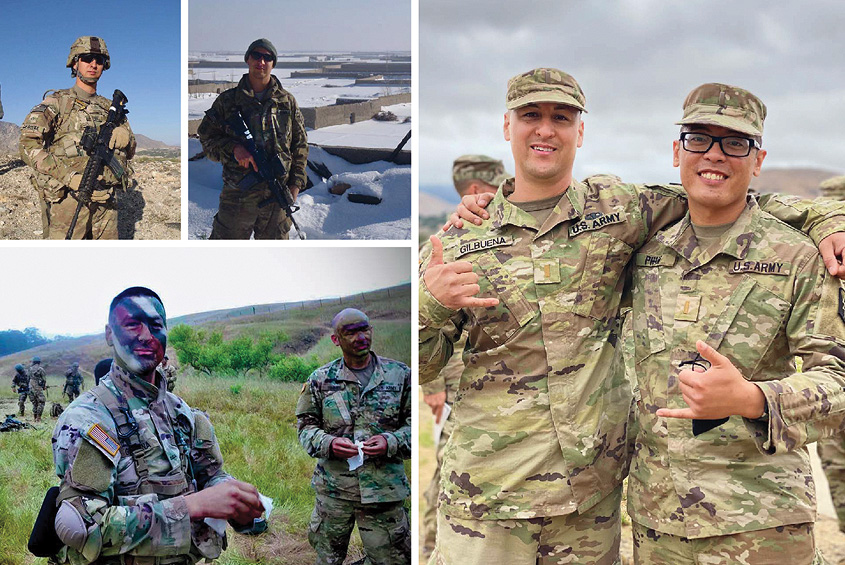
Chad-Michael Gilbuena joined the U.S. Army in 2009, serving four years as a mechanic attached to an infantry unit that was deployed to Afghanistan. He then served three years as a paratrooper with the 82nd Airborne Division. When he transitioned to the Army National Guard in Fresno in 2016, Gilbuena connected with the Veterans Education Program at Fresno State. He graduated in 2022 and said he’d “still be trying to get into the university” if it wasn’t for the program tailored to veterans.
Veterans Education Program: Serving Those Who Served
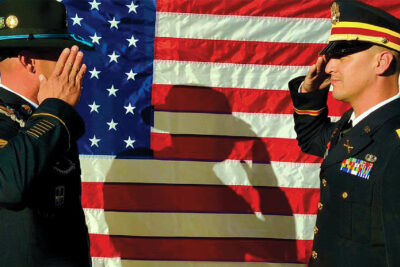 Chad-Michael Gilbuena partied his way through four community colleges before joining the U.S. Army in 2009. He enlisted to get a focus in life and prove himself worthy for the woman he loved.
Chad-Michael Gilbuena partied his way through four community colleges before joining the U.S. Army in 2009. He enlisted to get a focus in life and prove himself worthy for the woman he loved.
What followed were four years as a mechanic attached to an infantry unit — including deployment to Afghanistan. He then served three years as a paratrooper with the famed 82nd Airborne Division.
In 2016, Gilbuena transitioned to the Army National Guard in Fresno and started to explore getting a college degree. He originally believed he’d have to return to community college and improve his grade point average before attending a university. Then he connected with the Veterans Education Program at Fresno State.
“It was surreal,” Gilbuena says. “They said, ‘You’re automatically in the program. Here are your books. This is your classroom. All the instructors will come to you.’ It was totally unexpected and very much appreciated. Having the opportunity to get into Fresno State — it was always a dream of mine.”
Like all students, Gilbuena brought individual needs to the classroom. He has attention deficit hyperactivity disorder, which made concentrated reading difficult in high school and community college. “But the instructors in the veterans program helped me to cope by figuring out my best learning method.”
The program also helped Gilbuena transition from his communication style with soldiers — forceful and intense — to more low-key interaction with younger students at Fresno State. “They taught us how we needed to act and how to be successful in the college environment,” he says.
Gilbuena finished the Veterans Education Program and pursued a bachelor’s degree in recreation administration with an emphasis in adventure/tourism. One weekend a month for 18 months, he went to Officer Candidate School, which led to his commissioning as a second lieutenant in August 2021.
After graduating in May 2022, his next step is a full-time position with the U.S. Forest Service, where he interned in the spring 2022 semester. Gilbuena remains active in the Army National Guard. And, no matter where his career takes him, he will draw from the speech class in the Veterans Education Program. “It was pretty profound for me. It helped me become a better communicator and more of a leader.”
Gilbuena communicates clearly when asked if he would have accomplished so much without the Veterans Education Program. “Oh, absolutely not. I’d still be trying to get into the university.
— Douglas Hoagland (’74) (excerpt from ACCESS Magazine, a publication of the Division of Continuing and Global Education)
Around the Fountain
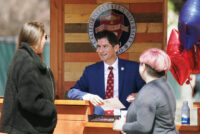 President Saúl
President Saúl
Fresno State President Saúl Jiménez-Sandoval introduced a new meet-and-greet space on campus where he and other administrators spend time each week fielding questions from students and listening to ideas and concerns. The booth, constructed by three engineering students, stands on the main path that leads to the Fresno State Library.
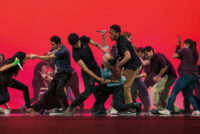 Summer Arts Tradition
Summer Arts Tradition
For the 18th year, Fresno State is hosting CSU Summer Arts, a program offering students and advanced practitioners the opportunity to live and study with world-renowned artists and CSU faculty in the fields of art, creative writing, dance, media, music and theatre. For more information about public events, visit CalState.edu/SummerArts.
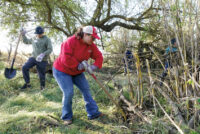 Alternative Spring Break
Alternative Spring Break
Thirty Fresno State students partnered with local organizations to volunteer over 750 hours of service during spring break, through the Jan and Bud Richter Center for Community Engagement and Service-Learning. Overall during the 2021-22 academic year, students, faculty and staff provided over 1 million hours of service to the community — the 13th straight year Fresno State has surpassed 1 million hours.
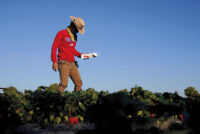 Addressing Global Food Insecurity
Addressing Global Food Insecurity
Leaders from Fresno State and the U.S. Army Civil Affairs and Psychological Operations Command (Airborne) signed a memorandum of understanding to formalize ongoing collaboration. For the past decade, the Jordan College of Agricultural Sciences and Technology has helped educate military civil affairs officers to better understand local farming systems in regions of the world where they will deploy, better preparing them to identify and address global food insecurity challenges, thereby reducing regional instability.
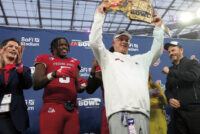 Championship Belt
Championship Belt
After beating Washington State 29-6 in the Jimmy Kimmel LA Bowl on Dec. 17, Fresno State was presented with a championship belt. The unique bowl game “trophy” was created by TrophySmack, a company co-founded by Fresno State alumnus Matt Walsh, who was featured on ABC’s “Shark Tank” in 2021.
 Welcome to New York
Welcome to New York
As storms pounded Central California in February, New York Times reporter Soumya Karlamangla contacted the Department of Media, Communications and Journalism at Fresno State for help reporting on the weather. An email and a phone call later, student Viviana Hinojos had her first assignment with the second-largest daily newspaper in the United States, and became part of a team covering the storms.
Donor Impact
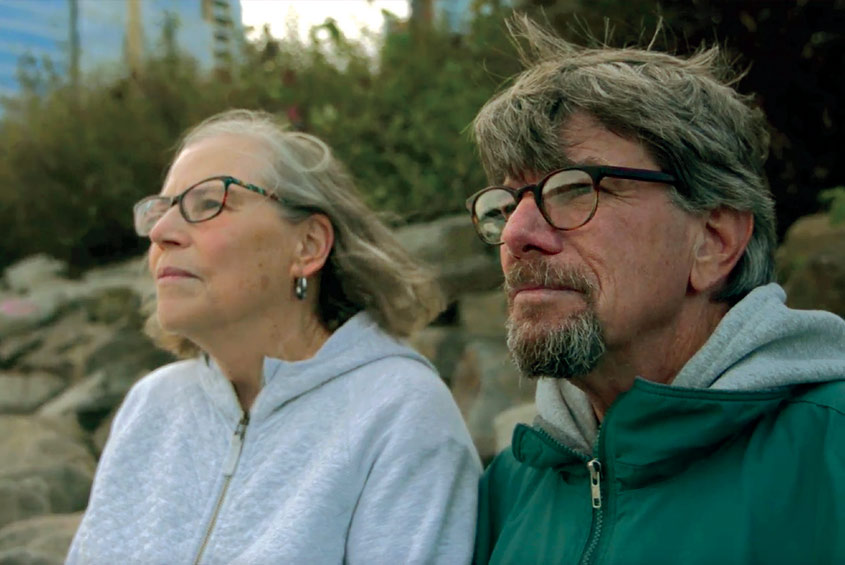
Gary and Marlene Peacock, who met during their time as Fresno State students in the 1970s, made a $7 million commitment through their estate to fund student scholarships in plant science and animal science.
Peacocks Expand Generosity with $7M Planned Gift
Gary and Marlene Peacock’s time in Fresno was relatively brief. Both were born and raised in other places, and they left shortly after graduating from Fresno State to begin their respective careers in the Bay Area’s technology industry.
But their time as Fresno State students holds great meaning and memory in their life story — so much so that they want to give back to the campus where their romance began and pay tribute to Marlene’s father in the process.
“That is the seed of our origin,” Gary Peacock says. “It’s where I met my wife. It’s where we got our college degrees. It provided a platform for us to be successful in the corporate world. And so we decided we wanted to make a significant difference.”
The Peacocks, married 45 years, met during their time as students at Fresno State in the 1970s — Marlene was a health science major, Gary majored in social sciences. They married in 1977 just days after they both graduated.
Their first gift to Fresno State in 2021 was to establish a scholarship to support students majoring in plant science or animal science.
Meeting the students who have been the recipients of their scholarships had a huge impact on the two of them. After seeing firsthand what their generosity provided for, the Peacocks wanted to do even more.
The Peacocks recently made a $7 million commitment through their estate to fund additional scholarships from their endowment. This planned gift serves as a tribute to Marlene’s father, Robert Krahenbuhl, who spent most of his career in agribusiness.
Marlene was born in Madera, but considers Red Bluff, a rural agricultural town in Northern California, her hometown. Gary was born in Queens, New York, and moved around growing up, a self-described “military brat.” His family ended up in Ridgecrest, where he attended high school and later came to Fresno State.
The couple now lives in Park City, Utah, with a second home in Portland, Oregon.
While Marlene didn’t end up pursuing the field she studied as an undergraduate, she still credits her Fresno State degree with opening professional doors for her.
“It had nothing to do with health science, absolutely nothing to do with it,” she says. “But they required a college degree and that started me on my path. I was in manufacturing from Day 1, and I stayed in manufacturing my entire career. But without that degree from Fresno State, I would not have gotten that job.”
College life at Fresno State helped set the stage for their future professional success — Gary with KLA Corporation and Marlene with Cisco Systems, Inc.
“I basically acquired independence at Fresno State and the environment there. We mostly spent our time on campus with our friends and the faculty and the facilities there. We spent a lot of time in the library and the student union going to all the events. And so I think it was helping us mature as individuals and then learning some life skills, learning critical thinking skills.”
They want to share that experience with future generations of Fresno State students through the scholarships they are funding.
“We wanted to make an investment in these students. We believe that it’s important that Fresno State continue to support the agricultural industry in the San Joaquin Valley,” Gary Peacock says. ”And it’s best to have highly educated people coming out of Fresno State with a degree that can help the industry.”
— Lisa Bell (’95)
Legacy of Giving Fuels Big Dreams
 London native Harriet Lynch was just 4 years old when her father took her to the driving range and let her hit her first bucket of golf balls. Since then, there have been very few days when Lynch hasn’t had a golf club in her hand.
London native Harriet Lynch was just 4 years old when her father took her to the driving range and let her hit her first bucket of golf balls. Since then, there have been very few days when Lynch hasn’t had a golf club in her hand.
“My dad and I share a love of the game,” says Lynch, now in her senior year as a business major at Fresno State. She earned a bid to represent Fresno State at the NCAA tournament after averaging a score of 73.27 in 11 tournaments this season, including a third-place finish in the Mountain West championship.
One day, she hopes to join her idol, English professional golfer Georgia Hall, on the LPGA Tour. “The big dream is the LPGA,” Lynch says.
Lynch would be the first to tell you she comes from a modest upbringing where “big dreams” tend to be elusive. “We weren’t struggling,” she says, “but my parents worked long, hard hours to give me and my brother everything we needed.” Lynch’s mother works as a personal assistant at a London bank. Her father, a retired detective, still drives a black cab part-time in the city.
“If I wanted to play collegiate golf,” she says, “I knew I had to get a full-ride scholarship somewhere.”
That somewhere turned out to be Fresno State, and the scholarship came from Herb and Melinda Depp, benefactors who recently eclipsed $1 million in philanthropic giving to the university.
“Without them,” Lynch says, “I wouldn’t have been able to come.”
Giving to Fresno State “probably started 30 or so years ago,” according to Herb Depp, who says it was a cold call from then-Fresno State President John Welty that got him started in philanthropy.
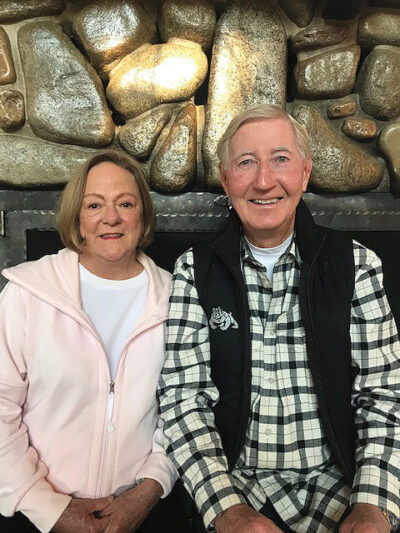
Both Herb (a Vietnam veteran and retired pilot) and Melinda (a retired schoolteacher) gave a $150,000 scholarship endowment to support students in the College of Science and Mathematics and the Kremen School of Education and Human Development (specifically in the area of teacher preparation).
“We still get letters from the recipients,” says Herb, a 2006 Top Dog Distinguished Alumni award winner from the College of Science and Mathematics.
The couple, now full-time Montana residents, first met on the Friday before classes started at Fresno State in fall 1962. Back then, tuition was $50 a semester, “whether you took one unit or 20 units,” Herb says. “I never knew anybody who had a student loan.”
“That’s because there were no student loans,” Melinda says.
After successful careers in aerospace and teaching, the Depps settled in Montana in 2010, where they met and befriended then University of Montana women’s golf coach Emily Loftin (née Milberger), whom the couple admired. She was hired to coach the Bulldogs women’s golf team in 2013 and the Depps started providing scholarships to help the golf team.
“Fresno State means everything to me,” says Herb Depp. “I met my wife of 55 years there. I had a glorious four years there.”
Herb hopes that one day, those who have been impacted by their gifts will pay it forward if they have the means to do so.
“You really can change lives and make a difference,” Melinda says.

